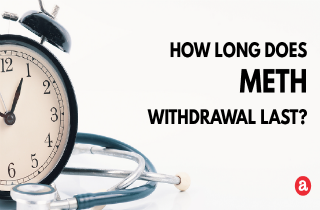Withdrawal symptoms can provoke relapse, especially when you are trying to quit meth. During the acute “sleep, eat, and drink” stage, your body and brain are in healing overdrive. Understanding of the course of meth withdrawal symptoms can help you plan your recovery and avoid relapse.
So, what can you expect during meth withdrawal? What’s the average duration of detox? We review here. Then, we invite your questions about meth withdrawal at the end.
How long until meth withdrawal starts?
Methamphetamine withdrawal varies depending on the level of addiction and frequency of meth use. However, symptoms develop within a few hours to several days after cessation of or reduction in heavy and prolonged use of meth. The most common symptoms which occur during meth withdrawal are:
- anxiety and nervousness
- depression
- gradual reversal of the pleasurable feelings induced by the drug
- increased appetite
- increased need for sleep, fatigue
Before you actually stop, it is a good idea to make sure your environment supports you. Finding help during meth withdrawal is crucial. This will mean distancing yourself from using buddies, places that remind you of using and surrounding yourself with people who will support you during your withdrawal.
How long do meth withdrawal symptoms last?
Withdrawing and detox from methamphetamine can be hard, but the unpleasant feelings and physical sensations will not last forever. Withdrawal usually lasts from 1 to 2 weeks, but it can last upwards of 4 weeks (in some extreme cases, longer).
Methamphetamine withdrawal is most severe in the acute phase of withdrawal, peaking during the first 24 hours and usually declining by the end of the first week of abstinence. Also known as the “sleep, eat, and drink” stage, your body and brain are in healing overdrive. Depressive and psychotic symptoms may also accompany acute withdrawal from methamphetamine, but usually resolve within a week, or so.
Following the acute withdrawal phase most withdrawal symptoms remain stable and at low levels for the remaining couple of weeks of abstinence. However, while the physical symptoms may resolve quickly, craving is also present. Cravings for meth are so difficult because of the extreme euphoria meth can induce. Most cravings last at least 4-5 weeks. This is where psychological and behavioral treatments can help.
Meth withdrawal timeline
Withdrawal from meth will be different for different people. The intensity of the symptoms experienced can depend on a few things such as how much you were using, your general health, any existing mental health issues and the length of time you were using meth. Here is a basic outline of how and when the signs of meth withdrawal appear. Please note that these are generalizations – not everyone will experience every single symptom within these windows of time.
24 – 72 hours – In this period of time you’ll probably feel exhaustion, need to sleep longer and feel depressive. Be on the lookout for extreme anxiety, panic, or suicidal thinking. Report any feelings of paranoia or hallucinations. These symptoms can be treated. Supportive medical interventions during acute detoxification and withdrawal are effective.
Week 1 – After a week, strong cravings for meth can appear. A feeling of hopelessness is common during this time, as are mood swings, anxiety, irritability, tiredness, agitation, sleep problems, poor concentration, aches, pains and headaches. You can also expect to feel hunger which can trigger rapid weight gain.
Week 2 – In two weeks you may still experience mood swings, depression, sleep problems and cravings. Other withdrawal symptoms can remained stable and at low levels for the remaining few weeks of abstinence.
Weeks 3-4 – After a month you should start to feel much better. Sleep patterns will improve, your energy levels will get better, and the mood settles.
Meth withdrawal: How long?
To review, meth withdrawal consists of two phases. The first phase is most intense during the first 24 hours after you last use meth, and gradually gets less intense over the course of about two weeks. The second phase is less intense, and lasts for about another two to three weeks. However, sometimes meth users experience withdrawal symptoms for months, known as post acute withdrawal syndrome (PAWS).
Meth withdrawal length questions
Did you find this article useful? If you still have questions about meth withdrawal or how meth withdrawal is treated, please write to us at the bottom of the page. We`ll try our best to respond to you personally and promptly…or to refer you to someone who can help.









Related Posts